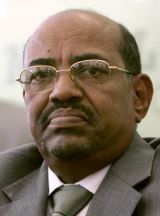Sudan says UN forces not needed in Darfur
Jan 10, 2007 (KHARTOUM) — Sudanese President Omar al-Bashir rejected Wednesday the deployment of U.N. troops in Darfur, saying they were not required and that African Union troops could maintain order in the war-wracked region of western Sudan.
 His comment contradicted statements by Sudanese officials, who said last month the government would accept a limited number of U.N. forces, as well those of A.U. officials who had proposed that the world body take over peacekeeping in Darfur.
His comment contradicted statements by Sudanese officials, who said last month the government would accept a limited number of U.N. forces, as well those of A.U. officials who had proposed that the world body take over peacekeeping in Darfur.
“Our experience with U.N. operations in the world is not encouraging,” al-Bashir told an Associated Press reporter Wednesday at his residence.
“There are sufficient forces in the Sudan from African countries to maintain order and they can provide order. All we need is funding for the African troops.”
Al-Bashir’s remarks showed his government has backtracked on its word in December when Sudanese officials said Khartoum would implement the plan for a U.N. deployment in Darfur announced by outgoing Secretary-general Kofi Annan at a meeting in Addis Ababa.
More than 20,000 people have been killed and 2.5 million forced to flee their homes in nearly four years of fighting in Darfur. U.S. President George W. Bush has labeled the violence “genocide” against the region’s ethnic African community. An A.U. force of 7,000 troops has tried to halt the conflict, but their commander has acknowledged they are overwhelmed.
“The force is too small to do the job,” Maj. Gen. Luke Aprezi said Tuesday when Richardson visited the A.U. headquarters in El Fasher, the capital of North Darfur. “We need more troops on the ground.”
Al-Bashir has long resisted international pressure to deploy U.N. peacekeepers in Darfur, saying they would be “colonialist.” But it’s thought that he fears a large U.N. presence would constrain Sudanese army troops and their allied janjaweed militia, as well as make it more likely that suspected war criminals be brought to trial by the International Criminal Court. Al-Bashir has refused to hand over suspects to the ICC.
Al-Bashir spoke Wednesday after talks with New Mexico Gov. Bill Richardson, a potential Democratic Party candidate for president in 2008 who is visiting Sudan on a mission to help bring peace to Darfur.
Richardson, who arrived Sunday, had hoped he could persuade al-Bashir to change his mind on the U.N. deployment, which was endorsed by the Security Council in August.
The governor was to meet later Wednesday with members of Sudan’s Cabinet and said he would discuss the results of his negotiations afterward.
Richardson has placed some of the blame for the violence on those Darfur rebels who refused to sign the cease-fire agreement that was brokered by U.S. and Nigerian negotiators in Abuja, Nigeria, last May.
“The situation is deteriorating,” Richardson told Sudanese reporters waiting outside the residence. “I’m concerned about it. I believe that the rebel groups need to become signatories to the peace agreement, the Abuja peace agreement. And we press the rebel groups very strongly to become part of the peace process.”
The Save Darfur Coalition brought Richardson to Sudan because the governor had successfully negotiated in the past with al-Bashir. In September, the governor persuaded al-Bashir to release a New Mexico journalist imprisoned in Darfur. He also worked with al-Bashir in 1996 to negotiate the release of three Red Cross workers kidnapped by Sudanese rebels.
The fighting in Darfur began in February 2003 when the region’s ethnic African population revolted against what they saw as decades of neglect and discrimination by the Arab-dominated government in Khartoum. The government launched a counter-insurgency in which the janjaweed, an Arab militia, committed widespread atrocities.
The government denies backing the janjaweed, but the U.N., the A.U. and international aid organizations say Khartoum has massively armed the militia and given regular army support to its attacks.
(AP)
